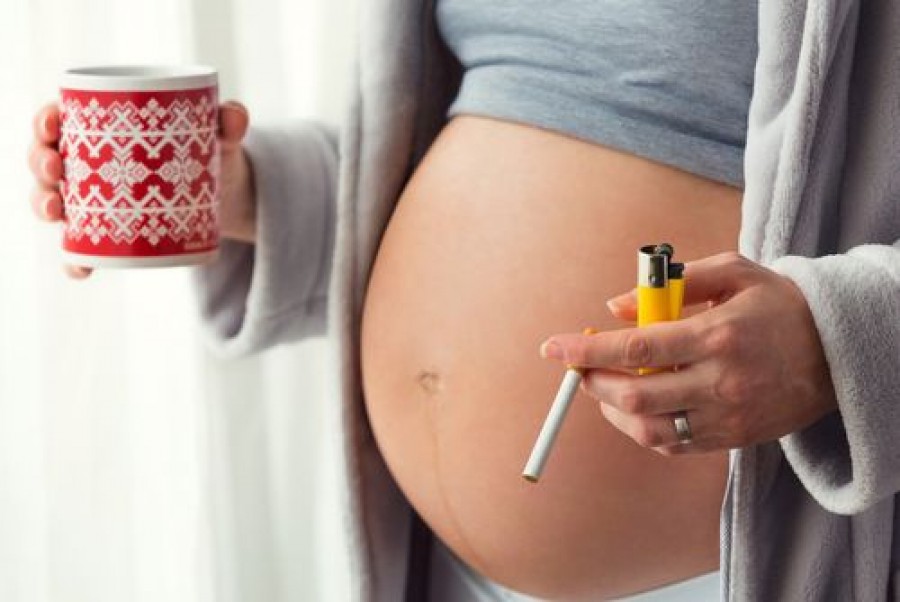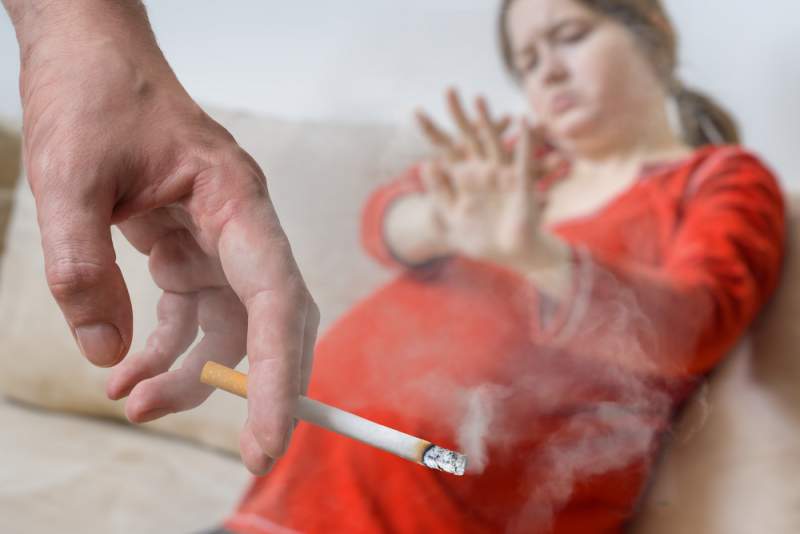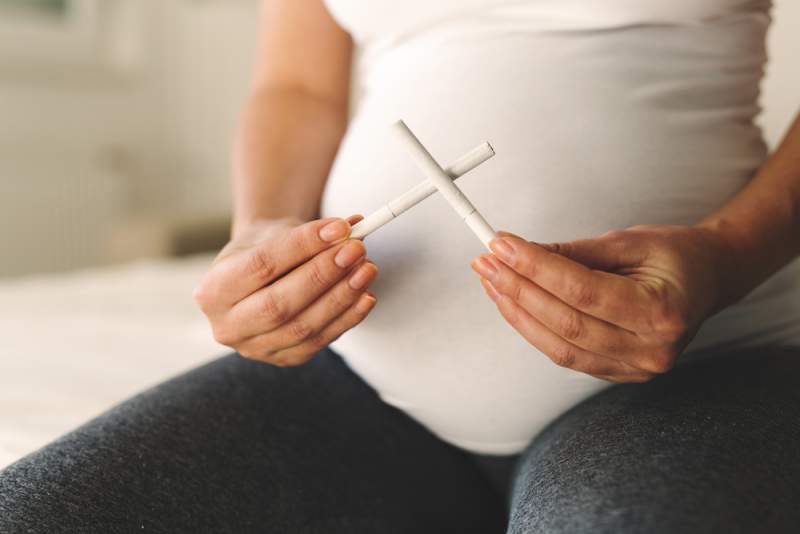Smoking during Pregnancy

Smoking cigarettes is never good for you, but smoking during pregnancy is even worse. It not only negatively impacts the expecting mother’s health, but also can have very serious negative effects on the baby’s health and development. Smoking can cause problems not just if done during the pregnancy; it can also cause problems before the pregnancy while trying to conceive, and after the pregnancy during breastfeeding as well as due to secondhand and thirdhand smoke.
Risks of smoking during pregnancy
Smoking during pregnancy has numerous health risks for both the pregnant mother and her developing baby. Some of these risks include:
Heightened chance of preterm labour
If you smoke during pregnancy, it increases your chance of going into preterm labour. Preterm labour is when you go into labour before 37 weeks of gestation. Preterm labour can lead to premature birth which means the baby would be born before they’re ready to be out of the womb. Babies born prematurely have a higher chance of health problems and even death.
Higher risk of placenta previa
Your chances of placenta previa increase if you smoke during pregnancy. Placenta previa occurs when all or part of the cervix is covered by the placenta. This poses a serious problem as the cervix is the opening of the uterus where baby passes through to the birth canal during labour. This condition almost always requires the mother to have a c-section.
Increased risk of placental abruption
Smoking during pregnancy increases your chances of placental abruption. Placental abruption is when the placenta separates from the wall of the uterus before the baby is born. This is a very serious life-threatening condition for both the mother and the baby. Not only does the placenta supply the baby with all of his/her oxygen and nutrients, but placental abruption also causes dangerous bleeding in both the mother and baby.
Greater chance of baby having a low birthweight
When an expecting mum smokes while pregnant, her bub has a higher chance of having a low birthweight. A baby is considered to have a low birthweight when they are born weighing less than 2500 grams. Babies with low birthweights are at higher risk of health problems throughout life as well as are the risk of dying in their first year of life.
Higher chance of birth defects
Babies of mums that smoke during pregnancy have a greater chance of developing birth defects. These possible birth defects include cleft lip and cleft palate. Both of which are birth defects of the baby’s mouth that can cause feeding, speech and hearing issues for the baby.
Increased risk of miscarriage or stillbirth
Miscarriage and stillbirth are the last thing a pregnant woman wants to think about; unfortunately, smoking during your pregnancy increases the chance of losing your baby to miscarriage or stillbirth. Miscarriage is when a baby is lost before 20 weeks gestation. After 20 weeks of gestation, the loss of a baby is referred to as stillbirth.
Higher risk of SIDS
The chance of SIDS, or Sudden Infant Death Syndrome, is also increased if the expecting mum smokes during her pregnancy. SIDS occurs when a less than one-year-old child, that seems perfectly healthy, dies without explanation.

Secondhand smoke during pregnancy and beyond
Secondhand smoke, also known as passive smoke, is the smoke that you inhale from being around someone else that is smoking a cigarette.Secondhand smoke during pregnancy can still cause many of the same problems that smoking during pregnancy can cause such as low birthweight of the baby. For this reason, you should always be cautious to avoid even being around someone that is smoking while you are pregnant. Secondhand smoke can also be dangerous for you and bub after they’re born. It’s best to avoid smoke altogether before, during and after pregnancy.
Thirdhand smoke during pregnancy and beyond
Thirdhand smoke is what is left behind from smoking cigarettes. It’s where the smell of smoke that sticks to things like clothing and furniture comes from. Even thirdhand smoke can be dangerous during and after pregnancy. Because of thirdhand smoke, it’s not even safe for expecting mums and bubs when someone smokes in a different room of the same house as them. Contact with thirdhand smoke has been known to cause problems like asthma and other breathing issues.
Breastfeeding and smoking
Smoking while breastfeeding can have adverse effects just as smoking during pregnancy can. To read more on the effects smoking has on the breastfeeding mother and her baby, read here.
Fertility and Smoking
Smoking cigarettes doesn’t just cause problems during and after pregnancy but it can also make it harder to get pregnant in the first place. Studies show that women who smoke usually take longer to get pregnant and are more likely to struggle with infertility. Even if a woman’s partner smokes and she doesn’t, she can still have a harder time getting pregnant.
Additionally, if a smoking woman does become pregnant, she is more likely to have an ectopic pregnancy. An ectopic pregnancy is when the fertilized egg implants itself in the fallopian tube rather than the uterus. This type of pregnancy must be terminated as it is impossible for the baby to survive and it can result in serious health risks to the mother, including death.
Tips to Quit Smoking During Pregnancy
- Ask someone to keep you accountable
- Request cigarette quitting aids from your pregnancy health care provider
- Keep a journal of the reasons you want to quit
- Decide to quit on a specific day
- Throw away all of your smoking paraphernalia (lighters, ashtrays, etc.)
- Keep your hands, mouth and mind busy as much as possible

The Earlier in Pregnancy You Quit Smoking, The Better
Quitting smoking when you are trying to conceive or when you find out that you’re pregnant is ideal. It can make a huge difference in not only your little one’s health, but your own health as well. Quitting smoking during pregnancy is a huge gift that only you can give to your baby as well as yourself.
Remember that it’s never too late to quit either. It’s definitely true that the sooner you quit, the better it is for you and your baby’s health and development, but quitting at any point will still be beneficial for both of you. Also, if you aren’t able to quit cold turkey, even reducing the amount you smoke daily can help to reduce the risks of smoking during pregnancy.
Ideally, you should stay away from smoke altogether during and after your pregnancy. Try not to beat yourself up if you aren’t able to quit smoking right away; stress is not good for your bub either. Just remember to always be honest with your health care provider, and do your best to take care of yourself and your sweet little one.



